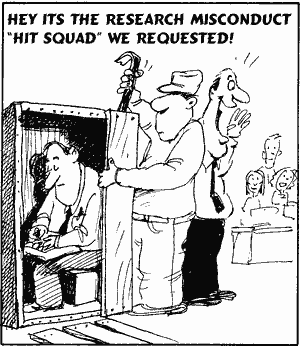 This story has been making the rounds. Orac hit on it as did Ben Goldacre (and others I am sure). To summarize (from NYT):
This story has been making the rounds. Orac hit on it as did Ben Goldacre (and others I am sure). To summarize (from NYT):
In what may be among the longest-running and widest-ranging cases of academic fraud, one of the most prolific researchers in anesthesiology has admitted that he fabricated much of the data underlying his research, said a spokeswoman for the hospital where he works.
The researcher, Dr. Scott S. Reuben, an anesthesiologist in Springfield, Mass., who practiced at Baystate Medical Center, never conducted the clinical trials that he wrote about in 21 journal articles dating from at least 1996, said Jane Albert, a spokeswoman for Baystate Health.
Unlike most other fraudulent scientific activity, like the Hwang Woo Suk cloning fraud, this guy simply never did the work, he made it up. Ben goes over how he was caught, and Orac discussed the consequences of his actions.
From Bad Science:
…fabrication is often easier to spot than selective editing…
from Orac:
It's hard to overstate how serious this revelation of scientific fraud is for the field of anesthesiology and medicine. Dr. Reuben was considered a pioneer in his field, and his work is not only widely cited, but serves as the basis for an amount of anesthesia practice that few academic anesthesiologists can lay claim to.
Ok, Reuben is a scumbag and endangered peoples lives and further, prevented science and medical knowledge from advancing forward as safely and expeditiously as it can.
I liken intentional medical and scientific fraud with pedophile priests. The possible damage is as wide ranging and as individually significant as that horrific phenomenon. Like Christians who say pedophile priests (or gun wielding zealots) aren’t Real Christians, we can safely say Reuben is no scientist.
Is there a difference? I mean people of significance perpetuate fraud and crimes against fellow people in both cases. These are people who are relied upon to confer good advice and trust. So what is the difference?
There is a huge difference in how this is dealt with in the scientific community and how betrayal is dealt with in religious realms. Consider the pedophile priests (not to mention embezzling adulterous evangelists, homosexual drug abusing preachers and so forth). There is a report put out by the catholic church that tries to put “in context” the results of a John Jay College study in 2002 that found:
- The history of abuse in the church goes back a number of decades with a surge between the 1960’s and 1980’s (75% of all the incidents)
- Total number of priests with allegations against them was 2.7% (ranging in communities between 2.5% to 7%)
- Half of all allegations were made between ten and thirty years after the incident.
- 52% of the abuses were by the resident priest or associate pastor
- 73% of the abuses happened in school, church, the priest/parish home or vacation house
There were certainly a number of responses to both credible and unsubstantiated allegations of abuse. While many of these lead to sex offender treatment, often multiple times, these never lead to jail time, and only in in less than half of the cases were the priests suspended. It was a system that tried to prevent the public from peering in.
How about fraudulent scientists? Obviously we can’t say that there are none, there are. It may be the esteem associated with the accomplishment of having many studies under your belt, it may be funding acquired by performing studies for companies. It may also be something as simple as getting attached to an idea that they can not let go of, particularly if the idea was initially developed by the researcher (Ernst and Singh describe the case of Benveniste in Trick or Treatment, who got so married to his bias ridden results that he would never admit failure and continued to make more scammy claims on top of his original ones).
However, in science your theories do not gain credence unless you publish or demonstrate them. This immediately opens the doors and the playing field of the idea. Unlike in the church, a closed system where problems and challenges are generally dealt with up and down the vertical hierarchy, publishing puts your results out there for all to see. If your results are generally in line with previous studies and known scientific boundaries, they are generally trusted (this was the case with Reuben, the drugs had already been preapproved for other things), while outlandish claims are treated with skepticism (like Benveniste). Skepticism leads to attempts at replication and verification.
Examine the results of fraud in science and abuse in the church. First in science there is the foundation of previous understanding. When fraud is detected there are generally 3 actions, legal, loss of status, and ridicule. In Reubens case, he had not gotten approval for human trials, but had claimed doing them (which is how the fraud was first detected). If he had done the trials, then reprimand or jail would have ensued. Next the entire scientific community will no longer trust his results and the hole left by his fraudulent studies will now be filled with good data. Finally there is ridicule or chastisement, like in blog posts, or how Benveniste received an Ig noble.
Personally, if there is fraud like this that can damage the public, I prefer it to happen in an arena like the scientific community has, instead of a closed system like the church or corporations.

